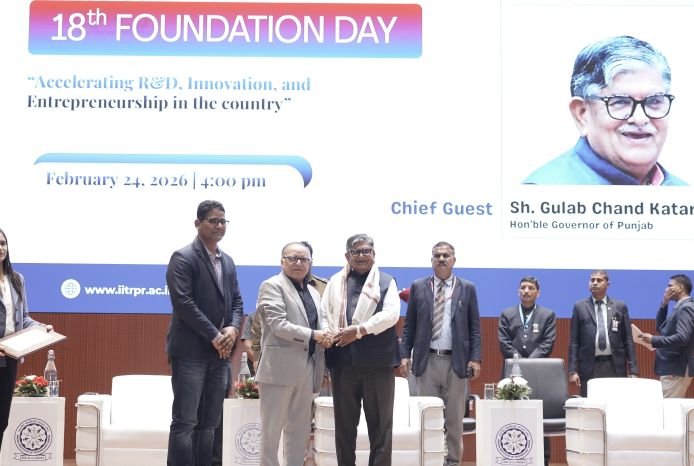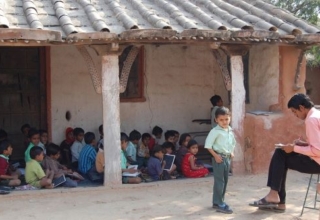The nationwide lockdown forced due to Covid-19 Pandemic had initially thrown higher education in deep crisis but universities and other HEIs in India have been able to adopt online teaching/learning from home rather quickly.
It is all the more gratifying that the young students have found Online Classes both interesting and greatly satisfying, says Prof PB Sharma, Prof PB Sharma, eminent academician and Vice Chancellor of Amity University Gurugram. “At Amity University the use of technology in education was already well integrated in our education innovations and almost the entire academic management was on IT savvy Amity Itranet *Amizone* that is the backbone of Amity academic and administrative e- governance. Further, the Amity University has a long experience of online classes that were going on years for great many African Countries live from its e-education studio at Amity University Noida,” he adds.
The IT team of Amity made arrangements for conduction online classes in all its Amity Universities across India utilising Microshort Teams, Microsoft LMS, Zoom meetings of HoIs and faculty and also trained its faculty in all the Amity Universities for use of e-platforms and the LMS system.
Covid19 sees Sona Group’s educational institutions accelerating education 4.0
The Salem institutes migrate all classes online and even placements are facilitated digitally
Long before the Covid-19 lockdown began, the digitally savvy Sona College of Technology, Sona School of Management and Thiagarajar Polytechnic College at Salem had with great forethought migrated their classes online. Not a single class was missed at the Sona group institutions as faculty members without missing a beat began engaging with students on platforms like Blackboard, lecture capture system, and Microsoft Teams or Zoom instead of the physical classroom.
At the Sona College of Technology, schedules are posted on the college’s learning management software platform Blackboard and online learning facilitated through Moodle and lecture capturing systems. The Blackboard content is updated by the faculty periodically to ensure that the learning outcomes are met. Assignments, Mini Projects, Quizzes and online internal assessments are conducted at appropriate intervals with faculty intervention.
Of course, it can get depressing being cooped up at home for a long time. For students who feel stressed being indoors for prolonged periods, the college has arranged online counselling.
Well before the Corona Crisis, the Salem based institute had geared for Education 4.0 aligning itself to the needs of the fourth industrial revolution. Smart technology, artificial intelligence and robotics are the backbone of the fourth industrial revolution and forward-thinking educational institutes have been changing their learning delivery systems as well as curriculum to meet the needs of a constantly connected world.
Sona has the necessary platforms to conduct both summative and formative evaluation in online mode. Sona also uses HireMee platform to conduct proctored exams which has AI based proctoring to identify if a student copies from books. HireMee coding tools are used for testing the programming skills.
At the Thiagarajar Polytechnic learning has continued uninterrupted with the institute activating its online platforms. The faculty utilises online services like Zoom, WhatsApp, Skype, Google Classroom to connect with students to complete their courses. Over 80 per cent of students get connected online and have been enjoying their new learning experience. Learners needing hand holding are addressed in separate groups to clear their doubts cleared at ease. Learning materials are shared via WhatsApp and Google classroom.
The assessments too are also conducted in virtual mode
The Polytechnic is offering Online Courses in Tally ERP 9 and Tax Accounting, Office Management and Python Programming through the Continuing Education Centre from April 10, 2020 onwards.
Since the Polytechnic is an Autonomous institution, it has the capability to conduct final examinations in an online mode post approval of the Directorate of Technical Education and the AICTE.
Meanwhile at the Sona School of Management, the second year MBA students are currently doing capstone project they have been allowed to use platforms like Google forms and Survey Monkey to collect data. The students are provided with the facility to access proprietary databases like EBSCO, ProQuest, Prowess etc from their home to facilitate their research work. Due to the lockdown the students have been permitted to do desk research. The students are monitored through emails, WhatsApp and phone calls.
Native Japanese language trainers are conducting Japanese classes through Zoom meeting tool. Also, all the students who already got offer letters from Japan based companies are being prepared for their work life in Japan by the teachers.
Digital Placements
Given the unprecedented situation, the three institutions have moved not just academics but their placement related training and testing to online platforms as well.
Resumes of small number of unplaced students already with prospective employers, and moving to the next stages. Online tests are conducted by companies which students can write with a webcam facility and net connection. Personal Interviews are conducted by companies through Zoom or Skype.
Marwadi University, Gujarat
Marwadi University, one of the leading private universities based in Gujarat offering BTech, MBA, BCA, BBA, MCA, BA and B.ComLLB amongst other courses, has announced focus on complete digitization of university operations as part of their COVID-19 Contingency Plan. The university is rapidly focusing on digital transformation and infrastructure upgradation in order to deliver all curriculum-related content and student lectures to students in the most seamless possible manner to mitigate any adverse impact due to the rapidly spreading COVID 19 outbreak. As of today, more than 8000 students have already been offered online classes under the initiative. Online classes for existing students are prioritised in order to prevent the lockdown from further impacting their learning requirements and commitments.
Marwadi University has so far utilized a host of online tools including Google Meet, Zoom, Facebook Live, Youtube, EDpuzzle, to name a few and also conducting frequent webinars to further strengthen the efficacy of virtual classrooms. The Engineering department of the university has already mapped and standardized delivery of more than 4 hours of Teaching Time Table, with online classes conducted for every batch of students at one-hour intervals. The Law faculty is using the Facebook Live option along with Zoom and Google meet in order to conduct the classes. Additionally, MU has also successfully implemented face recognition software for employee attendance instead of finger-based biometric attendance system in case of emergency visits.
Dr. Y P Kosta, Vice-Chancellor, Marwadi University said, “To produce individuals who are digital-age literacy has become more impertinent than ever. It is our duty to ensure they are digital-ready in whichever stream they operate. This is the core thought process behind Marwadi University’s speedy effort in ensuring a digital transformation, aiding a student’s higher education, especially at a time when they cannot physically attend classes. We are on a mission to produce the most creative, responsible and future-ready talent in India and are swiftly taking the necessary steps to provide students and faculty with the necessary facilities irrespective of the physical constraints. We are as committed as ever to offer world-class, cross-disciplinary higher education in strategic sectors of the economy through well-devised and synchronized delivery structures and systems.”
FLAME University, Pune
FLAME University too successfully moved to online classes for over 200 courses, including those as diverse as calculus, psychology, finance, economics, cinematography, music and visual art.
Vice-Chancellor, Dr.Dishan Kamdar said, “The coronavirus pandemic is a serious and alarming situation. Our first priority is health and well-being of our stakeholders, but that has not held us back from providing the best to our students. We are working in coordination with our faculty to give everyone the best support during this time. It is definitely a challenging situation but we have adapted well.”
A Digital Learning Task Force was formed to train and support faculty members to transition to conducting courses online. G-Suite products and Google Meet was chosen to centralize class scheduling and for providing tutorial support for faculty members and students. Two temporary studios were set up on campus as well.
Prof Hoshiar Mal recounts, “When I received a communication from the Vice-Chancellor about conducting online classes, I got a little worried because my course is hands-on and I thought it would be challenging for me to teach my course online. However, we adapted with some new techniques to keep multilateral communication and feedback intact. For example, I included a question after each slide of my online course. This approach worked well as it kept students engaged.”
For assessments, many faculty members leveraged FLAME University’s Learning Management System, to create online quizzes to engage students remotely. The FLAME University library is also digitized, which makes it possible for students and faculty to access all subscribed databases and digital resources from off-campus locations.







